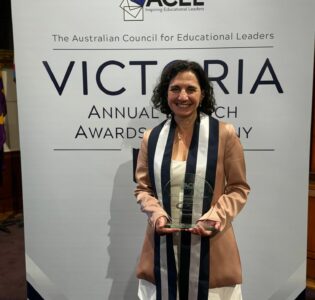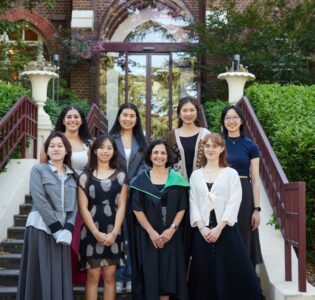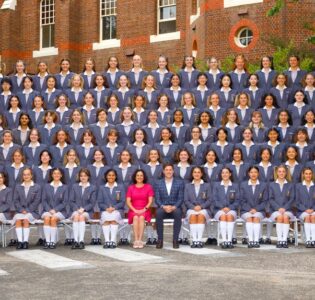Teachers are thought leaders and influencers
8 October 2019
BY ANN RENNIE, TEACHER AT GENAZZANO FCJ COLLEGE
First published in ‘The Australian’ Sept 17, 2019
A long time ago, in a kinder world less crazed by digital interruption, becoming a teacher was seen as a career that helped shape community. Deep knowledge and passion for a subject was passed on by well-educated, erudite and occasionally eccentric enthusiasts who had a gift for exciting and enabling their students. In school lore, certain teachers were accorded legendary status and their influence, moral and academic, on their students was abiding.
Those days of the Mr Chips or Mr Keating characters, and their female counterparts, are firmly in the past. Something important has been lost: a certain affection and respect for the “old school” teachers who knew their subject, their pupils and their pupils’ families, and were interested in a constellation of other activities attached to the school universe.
Today, although as important as ever, or perhaps even more important as teachers address every possible adolescent issue and social deficit in the crowded curriculum, teaching is viewed by many as a second-tier career.
When someone is referred to as “only a teacher”, it reflects an attitude suggesting the profession lacks profile, gravitas and adequate remuneration, and that teachers are little more than service providers of a mandated curriculum. Today’s teacher, despite postgraduate degrees, professional upskilling and years of experience, earns as much as the union lollipop person working overtime on a country road. This is risible in a country that aspires to be known as a knowledge nation.
Many of us have seen the erosion of professional standing and the new facelessness, especially in the tertiary sector, where learning can be delivered online and data analytics appears to be more important to education bureaucrats than literacy and numeracy. Forgotten is that day-in, day-out teachers all around the country are quietly building the future, aiming in their classrooms to pass on knowledge and to encourage microcosmic human hubs of empathy and collaboration that will one day be replicated in the grown-up world of work.
Executive advertisements frequently cite the qualities of thought leadership and influencer as they search for people who are innovative, dynamic, outcomes-focused, people-oriented and socially responsible. These people must be strategic, imaginative, build teams and a collegial community, write reports and have an expert understanding of their discipline. They are professional, ethical, engaged and available for after-hours consultation. They work to deadlines, look at big pictures and try to imagine how they can bring together skills and qualities that will shape enterprise and employment in the years ahead.
But those hardly cover the multitude of tasks the classroom teacher undertakes. For teachers, thought leadership and influencing are in constant practice. It is what good teachers do every day in how they conduct themselves, build social capital, work towards creating an inclusive and cohesive class, and get students thinking about the world and their place in it. It is about taking the time to embed attitudes and habits and to build little communities of learning. It is about relationships.
My job as a secondary teacher is never dull. Each day I interact with a hundred or more unique individuals, each with their own world view, their idiosyncrasies, their passion and the baggage of experience, good and bad, of life and school that comes with them.
This experience and its impact have positioned them to think a certain way. My job is to lead my students into new ways of thinking. I am a facilitator in opening up their thoughts, stretching and expanding them, providing some illumination and encouraging them to think beyond predictable and pedestrian patterns, and to find confidence in their own growing understanding. I am leading them to think for themselves — to arrive at reasons, solutions, compromises that are the result of discussion, occasional dissent and clarification. This is what education does — it gives the students the capacity to think beyond the prescriptive, to advance their own ideas, to create new ways of seeing things.
Teachers are also influencers. They know their students: what they do at the weekend, what footy team they barrack for, what instrument they play, who their friends are. We know that we contour the shape of their school day and the colour of their school experience.
We may forget what a particular teacher taught us but we will never forget how that teacher made us feel. I still remember the encouragement of Miss Hiatt, my Year 9 English teacher, who took the time to remind me that I didn’t need to use big words to impress. I still have those essays and her red Biro comments on my try-hard To Kill a Mockingbird text analysis.
I am eternally grateful that she rerouted the polysyllabic sludge of my teenage efforts. As we read the classic in my Year 10 class this year and got to know Atticus and Jem and Scout and Dill and Boo Radley, I could show my own egregious handwritten efforts from a lifetime ago to add a frisson of interest to my students.
I hope to lead my students to their own good thoughts and wise thinking, encouraging thought processes that are rich and insightful, thoughts that lead to new ideas and a sense of agency and autonomy. My colleagues and I will model a love of learning, humour, collaboration, persistence, reliability and punctuality (except perhaps for another staff meeting!). We will ask our students to raise the bar, not to settle for mediocrity, but to do their best because trying and trying again is the unsung hero of most lives. I will exhort my students to reach beyond their grasp, to do more than just satisfy the minimal requirement and to check their possessive apostrophes.
Next time you see an advert from a headhunting agency in the professional or executive pages asking for thought leaders and influencers — who will be handsomely remunerated — think of your children and their classroom teachers. Remember that teacher who saw your potential and subtly suggested you try a different approach. Remember the teacher who was a bit of a disciplinarian but whose passion for their subject shone. Remember the teachers you talk about with great fondness at the 20, 30 or 40-year reunion.
Everyone has a teacher story and the vast majority of these are positive. Now is the time for a new chapter for the profession, time for recognition that much of the work of social infrastructure is undertaken by teachers, as well as the building of our children into literate and numerate, imaginative, compassionate and curious seekers of knowledge and skill. Students across the nation are being taught how to think for themselves, to open their minds to the world, to create a bright future.
Their classroom teacher is a thought leader and influencer who could change their lives.
They are never, ever “only a teacher”.




